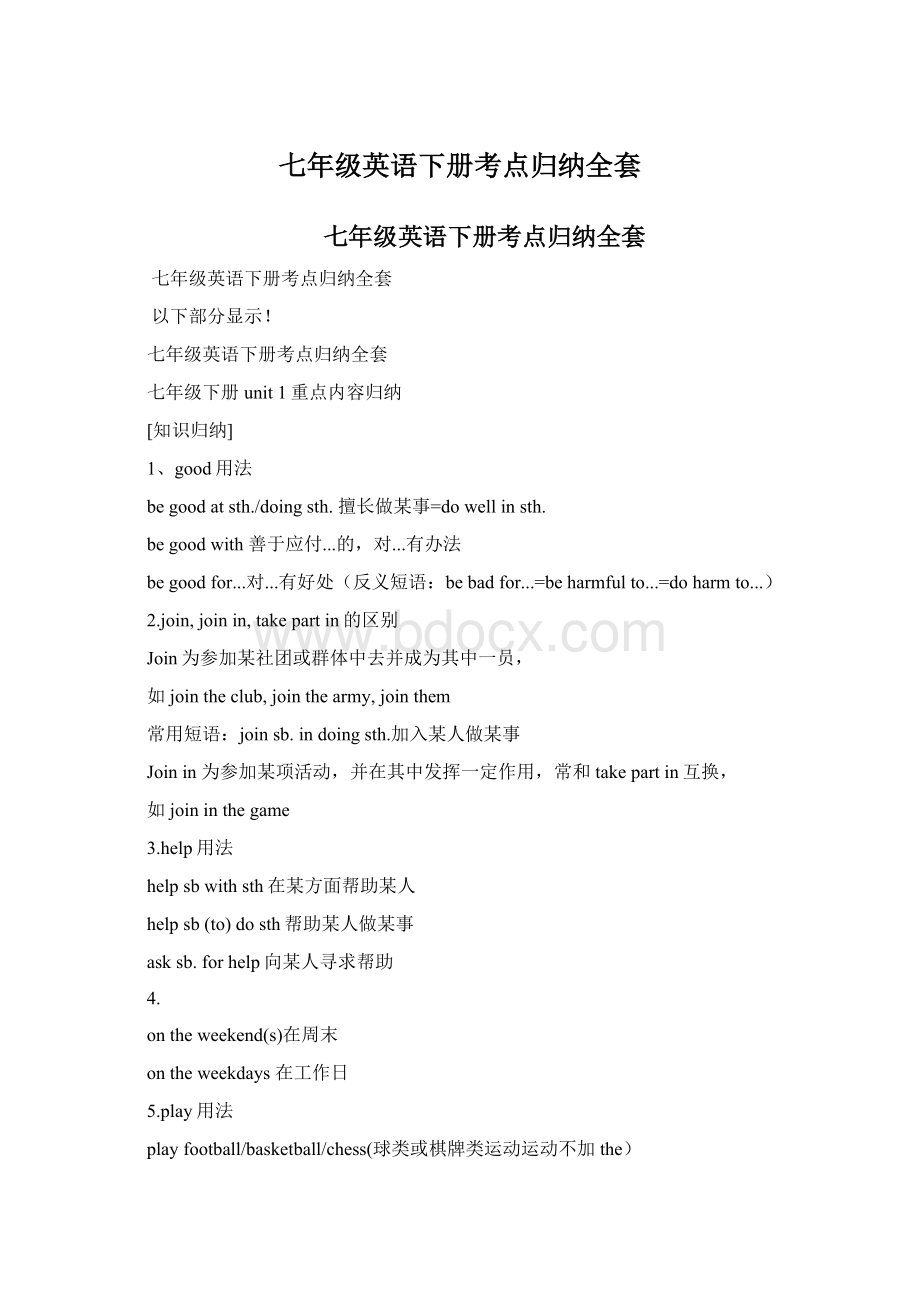七年级英语下册考点归纳全套.docx
《七年级英语下册考点归纳全套.docx》由会员分享,可在线阅读,更多相关《七年级英语下册考点归纳全套.docx(12页珍藏版)》请在冰豆网上搜索。

七年级英语下册考点归纳全套
七年级英语下册考点归纳全套
七年级英语下册考点归纳全套
以下部分显示!
七年级英语下册考点归纳全套
七年级下册unit1重点内容归纳
[知识归纳]
1、good用法
begoodatsth./doingsth.擅长做某事=dowellinsth.
begoodwith善于应付...的,对...有办法
begoodfor...对...有好处(反义短语:
bebadfor...=beharmfulto...=doharmto...)
2.join,joinin,takepartin的区别
Join为参加某社团或群体中去并成为其中一员,
如jointheclub,jointhearmy,jointhem
常用短语:
joinsb.indoingsth.加入某人做某事
Joinin为参加某项活动,并在其中发挥一定作用,常和takepartin互换,
如joininthegame
3.help用法
helpsbwithsth在某方面帮助某人
helpsb(to)dosth帮助某人做某事
asksb.forhelp向某人寻求帮助
4.
ontheweekend(s)在周末
ontheweekdays在工作日
5.play用法
playfootball/basketball/chess(球类或棋牌类运动运动不加the)
playthepiano/theguitar/theviolin(西洋乐器前需加定冠词the)
6.speak,talk,tell,say
Speak表示说话能力,常和语言连用,
如SpeakEnglish;Canthebabyspeaknow?
Talk表示交谈,
常见词组为talkwith/tosb,haveatalk
Tell表示告诉或判断意思,
常见词组为tellsbaboutsth./tellthedifferences./tellastory
Say表示说话的内容,
常见的搭配为saysomething
[重点短语]
art/music/chess/swimming/Englishclub美术/音乐/国际象棋/游泳/英语俱乐部
afterschool放学后
befree有空
begoodwithsth./sb.善于应....的;对....有办法
begoodatdoingsth.擅长做某事
callsb.at拨.....给某人打电话
dokungfu练功夫
havetime有时间
inthemusicroom在音乐室
likedoing/todosth.喜欢做某事
makefriends结交朋友
musicfestival音乐节
ontheweekend/onweekends(在)周末
playchess/basketball下象棋/打篮球
playtheguitar弹吉他
playtheviolin/drums/piano拉小提琴/敲鼓/弹钢琴
playsoccer/games踢足球/做游戏
play..with...和....玩......
schoolshow学校演出
thestorytellingclub讲故事俱乐部
tellstories讲故事
talkto/with...跟....说/与....交谈
theoldpeopleshome敬老院
wanttodosth.想要做某事
[重点句子]
Areyoubusyafterschool?
放学后你忙吗?
Areyougoodwitholdpeople?
你善于与老人相处吗?
CallMr.Brownat293-7742.请拨293-7742找布朗先生。
Canyouplaytheguitar?
你会弹吉他吗?
Doyouhavetimeontheweekend?
你周末有时间吗?
Iwanttojointheartclub.我想加人美术俱乐部。
Iliketoplaybasketball.我喜欢打篮球
IcanspeakEnglishandIcanalsoplaysoccer.我会说英语,我也会踢足球。
PleasetalktoMr.Zhangafterschool.请放学后找章老师谈。
Theschoolneedshelptoteachmusic.学校需要人帮忙教音乐。
Whatclubdoyouwanttojoin?
你想加入什么俱乐部?
Whatsportscanyouplay?
你会做什么运动?
Whatcanyoudo?
你会做什么?
Youreverygoodattellingstories.你很擅长讲故事。
[本单元语法]
一、情态动词can的基本用法
情态动词can有一定的词义,但不能独立存在,它必须与动词原形一起构成谓语。
can没有人称和数的变化。
其具体用法如下:
1.表示能、会,指脑力或体力方面的能力。
例如:
IcanspeakEnglish.我会讲英语。
JimcanswimbutIcant.吉姆会游泳,但我不会。
2.表示可能,常用于否定句或疑问句中,指某种可能性。
例如:
HanMeicantbeintheclassroom.韩梅不可能在教室里。
Canheeheretoday,please?
请问他今天能到这里来吗?
3.表示可以,常用于口语中,指许可或请求做某事。
例如:
CanIhaveacupoftea,please?
请问我可以喝一杯茶吗?
Youcangoout.你可以出去了?
二、情态动词的注意事项
1.can的口诀:
情态动词can、can、can,动词原形跟后面。
变疑问can提前,变否定not后面加上去。
主语人称单复数,情态动词不能变。
2.情态动词can可以引导肯定句和疑问句。
肯定句:
主语+can+动词原形+其他成分
疑问句:
can+主语+动词原形+其他成分
3.can引导的肯定句变为疑问句的方法:
(一调二改三问号)
can提前,首字母大写。
(一调)
肯定句中主语在变成疑问句时的变化。
(二改)
如:
肯定句:
Youcanfeedtheanimals.你可以喂动物。
疑问句:
CanIfeedtheanimals?
我能喂动物吗?
在句尾后面加问号。
(三问号)
4.Can的一般疑问句回答:
肯定回答:
Yes,主语(必须人称代词)+can.
否定回答:
No,主语(必须人称代词)+cannot(cant)/mustnt.
Yes或no后要使用逗号,除了I以外,其他人称都要小写。
5、表推测是肯定推测用mustbe,否定推测为cantbe
七年级下册unit2重点内容归纳
[知识归纳]
1、Either...or...
eitheror主要用于表示选择,其意为要么要么或者或者,用于连接两个性质相同的词或短语.如:
Youcanhaveeitherthisoneorthatone.
你拿这个或那个都可以.
Youmusteithergoatonceorwaittilltomorrow.
你要么马上走,要么等到明天.
Wecanfinishtheworkeitherthisweekornextweek.
不是这星期就是下星期我们就可完成这项工作.
特别注意:
eitheror连接两个成分作主语时,谓语动词的形式遵循就近原则.如:
EitheryouorIamtogo.你或我必须有人去.
Eitherheoryouareright.要么他对,要么你对.
3、Exercise
exercise做锻炼时为不可数名词,如doexercise
exercise做练习或操讲为可数名词,如domathexercises,domorning/eyeexercises
2、job/work
job就是指具体的一份工作,为是可数名词;work做动词时,常指工作状态
如:
Whatsyourjob?
Ihaveawonderfuljob,itssoexciting.
A:
Whatareyoudoingrightatthismoment?
B:
Imworking!
work作名词有两种意思:
指工作时为不可数名词outofwork表示失业;
做可数名词时表示著作,如LunXunsworks
4、Lotsof
Lotsof=alotof既可以修饰可数名词又可以修饰不可数名词
注意:
alot不能修饰名词,常用来修饰形容词或动词,为副词词性
5、频度副词
频度副词按频度从高到底为
Alwaysusually(generally)-often-sometimes-seldom-hardly-never
对频度副词提问常用howoften
6、Taste
taste作动词时,有两种情况:
taste后可跟名词或代词,意为尝、品尝某物。
如:
Tomsmelledthemooncakeandthentasteditagain.
taste后可跟形容词,意为尝起来...,此时它是感官系动词。
如:
Themooncakeswithnutstastemoredeliciousthanthosewithsugar.
其他感官系动词:
feel,sound,look,smell等
taste也可作名词,意为味道、品尝或品味。
如:
Pleasehaveatasteofthischeese.
Sugarhasasweettaste.
Hehasagoodtaste.
[重点短语]
atsixthirty在六点半
afterdinner晚餐后
atnight在夜间
afterthat在那之后
aquarterpastthreeintheafternoon下午三点一刻
belateforwork上班迟到
brushteeth刷牙
begoodfor..对.....有益/好处
do(ones)homework做作业
eat/havebreakfast吃早餐
eatquickly快速地吃
eatagoodbreakfast吃一顿丰盛的早餐
either..or...或者...或者...
from...to...从.....到......
gohome回家
gotoschool去上学
gotowork去上班
gotobed(early)(早早)去睡觉
getup起床
getdressed穿上衣服
gethome到家
halfanhour半小时
halfpastsixinthemorning早上六点半
lotsof/alotof...大量,许多
onweekends(在)周末
play/dosports做运动
playputergames玩电脑游戏
radiostation/show广播电台/广播节目
takeashower洗淋浴
takeawalk散步;走一走
[重点句子]
Attenthirty,IbrushmyteethandthenIgotobed.
十点半,我刷牙,然后上床睡觉。
Attwelve,sheeatslotsoffruitandvegetablesforlunch.
到了十二点,午饭她吃很多水果和蔬菜。
Afterschool,Isometimesplaybasketballforhalfanhour.
放学后,我有时打半小时的篮球。
Afterthat,Iusuallyexerciseatabouttentwenty.
在那之后,我通常在10点20分左右锻炼。
Heworksataradiostation.他在一家广播电台工作。
Iusuallygetupatsixthirty.我通常在六点半起床。
Imneverlateforwork.我上班从来不迟到。
Idontliketogetupearly.我不喜欢早起。
Idonthavemuchtimeforbreakfast,soIusuallyeatveryquickly.
我没有太多的时间吃早饭,所以我通常吃得很快。
Intheevening,IeitherwatchTVorplayputergames.
晚上,我要么看电视,要么玩电脑游戏。
--Scott,whattimeisyourradioshow?
斯科特,你的广播节目在几点?
--Fromtwelveoclockatnighttosixoclockinthemorning.从夜里12点到早上6点。
Sheknowsitsnotgoodforher,butittastesgood!
她知道(吃冰淇淋)对她不好,但它尝起来很美味!
Thatsafunnytimeforbreakfast!
那个时间吃早饭真有意思哟!
Whattimedoyouusuallytakeashower,Rick?
里克,你通常几点钟洗淋浴?
Whendoyougotowork?
你什么时候去上班?
WhenIgethome,Ialwaysdomyhomeworkfirst.
当我回到家时,我总是先做作业。
[本单元语法]
一、whattime与when
1.whattime翻译为几点问的是具体的时间,一般回答要具体到小时。
Whattimedoyougotoschool?
你什么时候/几点上学?
Igotoschoolathalfpastsevenoclock.我七点半去上学。
注意时间点前要加介词at
2.when也是提问时间,但与whattime的区别是:
用when提问,回答既可以是具体的时间,也可以是不具体的时间,
如:
inthemorning/afternoon/evening,lastyear,in1998等范围大的时间,例如:
Whendoeshetakeashower?
他什么时候洗澡?
Hetakesashowerintheevening.他在晚上洗澡。
也可用具体时间:
Itakeashowerat6oclockintheevening.我晚上六点洗澡。
3.问时间点只能用whattime,如Whattimeisit?
二、频率副词的使用用法
几个常见频率副词的用法
★always
always意为总是,与进行时态连用时,也可用来表达喜爱、厌恶等感情色彩。
e.g.
Ishallalwaysremembermyfirstdayatschool.我将永远记住我上学的第一天。
Heisalwayssmoking.他总是抽烟。
(厌恶情感)
Sheisalwayssoelegant.她总是如此高雅。
(赞美情感)
★usually
usually可以指通常的动作,侧重已经形成的习惯。
e.g.
IusuallydosomeshoppingwithmyparentsonSundays.
我通常在星期天和我的父母一起去买东西。
Heusuallygoestoschoolbybike.他通常骑自行车上学。
★often
often是指经常性的动作,意思为常常,经常。
e.g.
Childrendontoftendohomework.孩子们经常不写作业。
Heisoftenlateforschool.他经常上学迟到。
★sometimes
sometimes意思为有时,不时,表示次数较少(低于often所表达的次数),常常与一般现在时或一般过去时连用。
e.g.
Sometimeshegoestoworkbybike,andsometimeshegoesbybus.
有时候他骑自行车上班,有时候他乘公共汽车上班。
SometimesIhelpedmyparentsinthehouse.有时候我帮助父母做家务。
★hardly
hardly意思为难得,几乎从来不,它所表示的次数非常少。
e.g.
Hehardlydrinks.他几乎不喝酒。
Shehardlyplayscards.她几乎不打牌。
特别注意:
hard与hardly为形近词,但是在意义上并无关联
Hard做形容词时意为坚硬的,困难的
做副词时意为努力地,刻苦地
★never
never意思为决不,从未,表示一次也没有。
e.g.
Heneverlivesthere.他从来都没有在那儿住过。
Sheneverhasanythingtodo.她一向无所事事。
图示:
100%7080%60-70%30-40%0
它们均属于模糊频率,无法表示具体次数
★但是以下这些频率副词可以准确地表达事情发生的频率。
Once一次twice两次基数词+times...次
七年级下册unit4重点内容归纳
[知识归纳]
1、arrive
arrivein:
到达大地点
arriveat:
到达小地点
其他表示到达的词组或单词还有getto,reach
其中arrive/get为不及物动词,reach为及物动词
2、bring/take
Bring表示带来;
Take...to...表示把某物带到哪去,强调带走;
Takesthwithsb可以表示随身携带
Take...forawalk带...去散步
3、listento,hear,sound
listento:
听的动作;
hear:
听见,强调听的结果(hearfrom...收到...来信;hearabout/of听说);
sound:
听起来,半系动词,后加形容词
4、
makeonesbed:
铺床
makeoneswayto...:
向...走去
maketea:
沏茶
5、ontime,intime
ontime:
准时
intime:
及时
6、practicedoing:
练习做某事
7、remember
remembertodo:
记得去做某事,事情还没有做;
rememberdoing:
记得做过某事,事情已做。
类似的还有:
forgettodo,forgetdoing;
regrettodo,regretdoing
8、strict
bestrictwithsbinsth.对某人在某方面严格
(人作宾语用介词with,物作宾语用in)
[重点短语]
alotofrules许多规则
be/arrivelatefor迟到
bring...to...把.....带来....
bestrict(withsb.)(对某人)要求严格
beontime准时
dothedishes清洗餐具
everymorning每天早上
followtherules遵守规则
goout外出(娱乐)